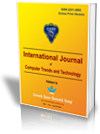Assessing Moodle as Learning Management System Platform for English Course Based TOEFL

Irfan Syamsuddin , Alimin "Assessing Moodle as Learning Management System Platform for English Course Based TOEFL". International Journal of Computer Trends and Technology (IJCTT) V18(6):276-279, Dec 2014. ISSN:2231-2803. www.ijcttjournal.org. Published by Seventh Sense Research Group.
Abstract
This paper reports a research in progress of an academic effort to adopt TOEFL materials into English course for vocational education particularly at State Polytechnic of Ujung Pandang. During the last five years, open source Learning Management Systems called Moodle has been used in the institution as a platform to deliver several science and engineering related courses in blended learning environment. This study investigates and assesses how the similar platform might also be used to enhance English teaching which contents have been enriched based on TOEFL system. Basic features of Moodle were assessed according to three main TOEFL skills namely TOEFL Listening Comprehension (LC), TOEFL Structure and Written Expression (SWE) and TOEFL Reading Comprehension (RC). Our findings suggest that while most Moodle’s features ready for delivering TOEFL based English course, except in handling Listening skills. Future works is recommended to apply additional Moodle plugins to tackle the issue addressed in this study.
References
[1] P.Prince (2012). Towards an Instructional Programme for L2 Vocabulary: Can a Story Help?. Language Learning & Technology, 16(3), 103-120.
[2] N. P., Ololube (2014). Blended Learning Methods in Introduction to Teaching and Sociology of Education Courses at a University of Education. Advancing Technology and Educational Development through Blended Learning in Emerging Economies, 108-127.
[3] D. J. ,Tedick (2009). K–12 language teacher preparation: Problems and possibilities. The Modern Language Journal, 93(2), 263-267.
[4] M.,Koehler and P. Mishra (2009). What is technological pedagogical content knowledge (TPACK)?. Contemporary Issues in Technology and Teacher Education, 9(1), 60-70.
[5] M.,Koehler and P. Mishra (2008). Introducing tpck. Handbook of technological pedagogical content knowledge (TPCK) for educators, 3-29
[6] S.R. Robbins (2002). The evolution of the learning content management system. Learning circuits.
[7] D.Weaver, C.Spratt, and C.S. Nair. (2008). Academic and student use of a learning management system: Implications for quality. Australasian Journal of Educational Technology, 24(1), 30-41.
[8] B.Beatty & C.Ulasewicz (2006). Faculty perspectives on moving from Blackboard to the Moodle learning management system. TechTrends, 50(4), 36-45.
[9] P. C.Sun, R. J. Tsai, G.Finger, Y. Y Chen and & D. Yeh (2008). What drives a successful e-Learning? An empirical investigation of the critical factors influencing learner satisfaction. Computers & Education, 50(4), 1183-1202.
[10] S. H. Kan (2002). Metrics and models in software quality engineering. Addison-Wesley [11] I. Syamsuddin (2012). Fuzzy Multi Criteria Evaluation Framework for E-Learning Software Quality. Academic Research International, 2(1), 139-147.
[12] I. Younas and D.Martin, (2005) An Expert System Measuring Effectiveness of an E-learning Environment.
[13] M. Aberdour. (2007). Open source learning management systems. Available on: www. epic. co. uk/content/news/oct_07/whitepaper. pdf.
[14] TOEFL Wikipedia Available on: en.wikipedia.org/wiki/ Test_of_English_as_a_Foreign_Language [15] Šumak, B., Heri?ko, M., Pušnik, M., & Polan?i?, G. (2011). Factors affecting acceptance and use of Moodle: An empirical study based on TAM. Electrical Engineering, 35, 91-100
[16] Akpinar, Y. (2008). Validation of a Learning Object Review Instrument: Relationship between Ratings of learning objects and Actual learning outcomes. Interdisciplinary Journal of E-Learning and Learning Objects, 4(1), 291-302.
Keywords
Learning management system, Moodle, English course, TOEFL, vocational education


